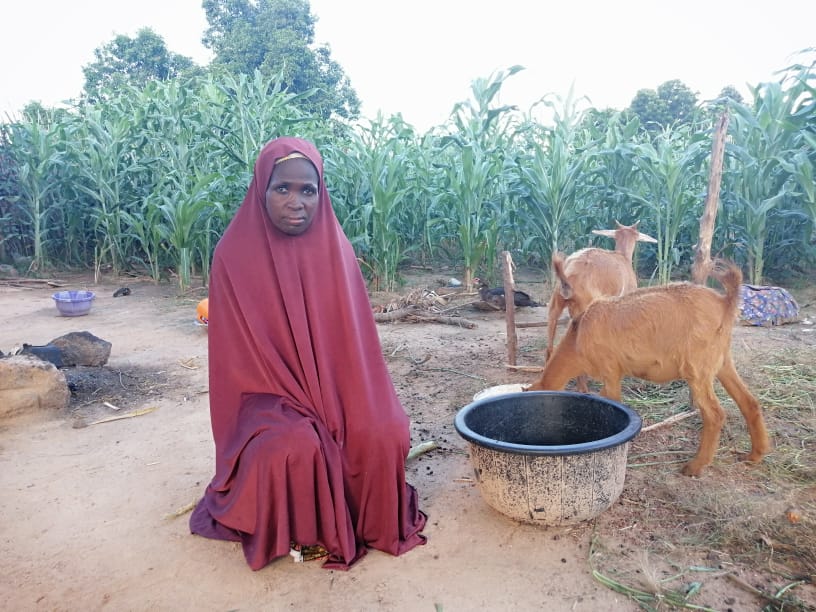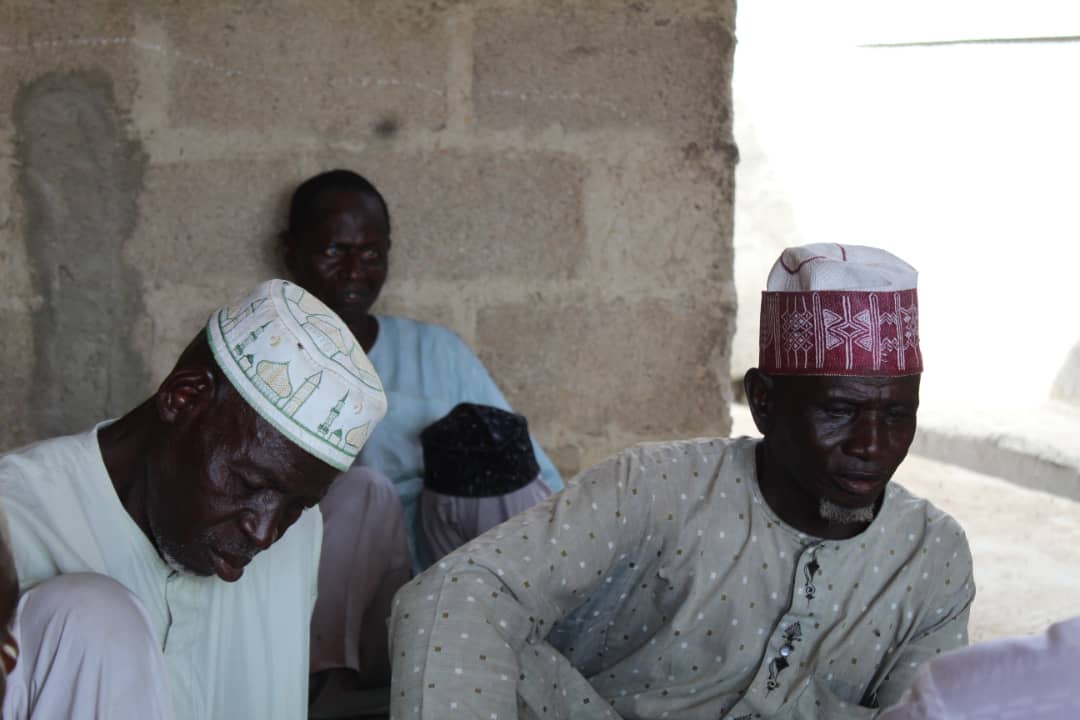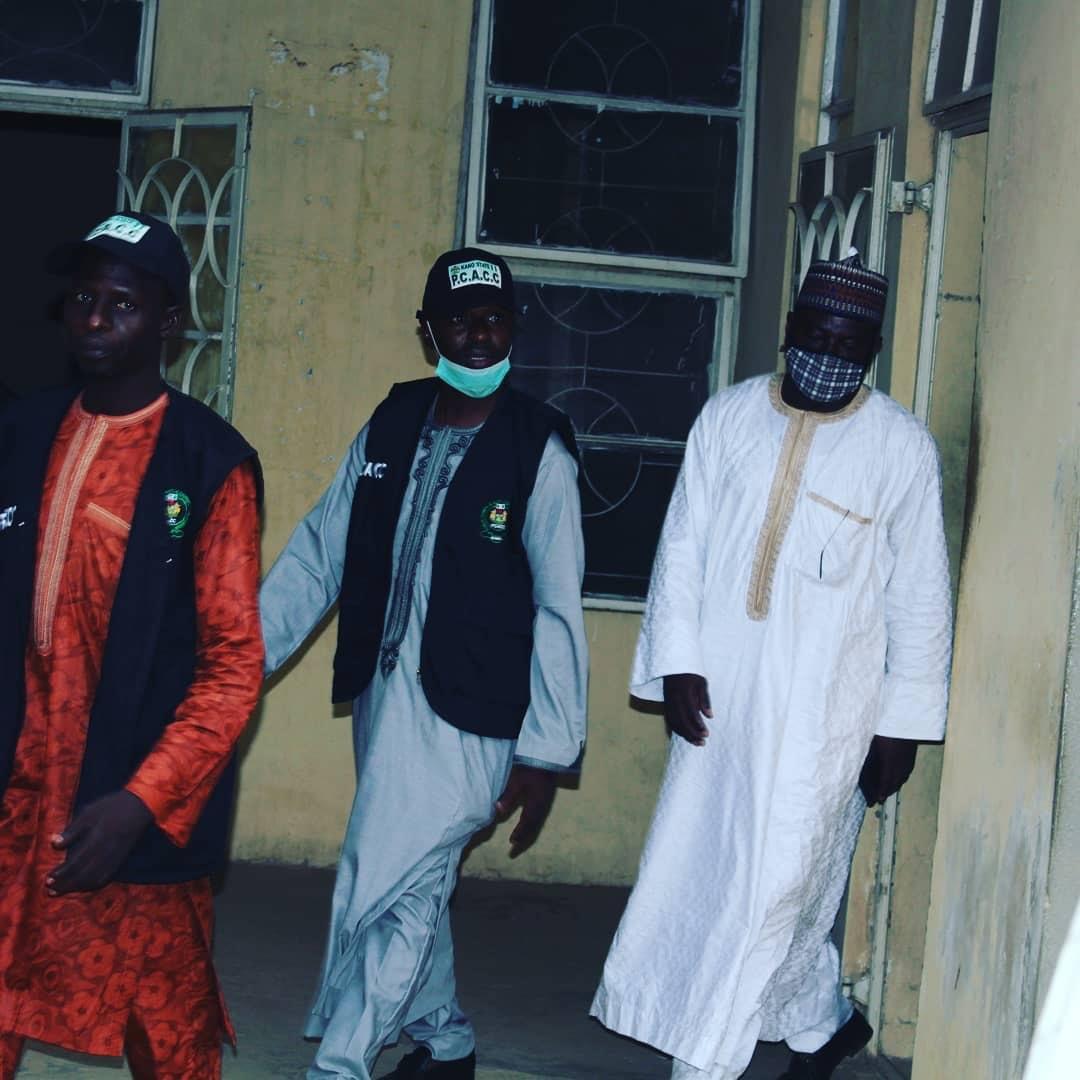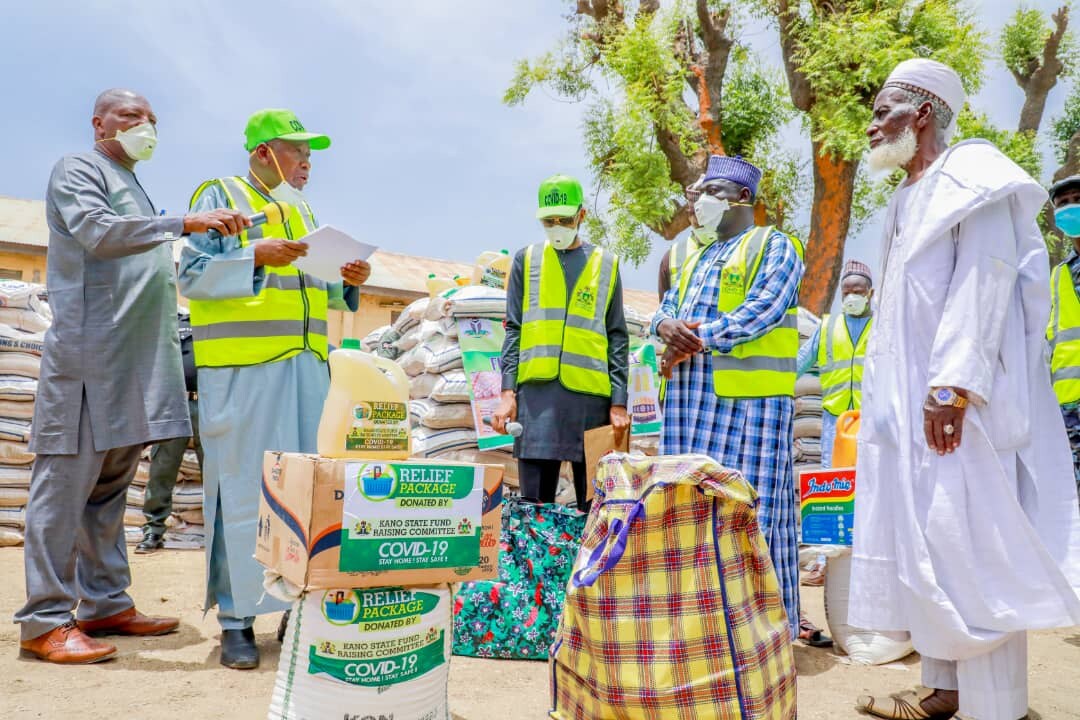INVESTIGATION | When COVID-19 palliatives got diverted
The COVID-19 palliatives distribution regimes in Kano and Jigawa states have left in their wake a litany of complaints and allegations of diversions against politicians, traditional rulers and even proprietors of Almajiri schools

The sandy, erosion-ridden path leading to Fatsuma Yusuf’s home on the edge of Jaudi village is a sufficient pointer to the real-life condition of the fifty-year-old widowed mother of seven. Having lost her husband of almost thirty years on the first day of the holy month of Ramadan six years ago, the responsibility of catering for her five daughters and two sons had fallen squarely on the frail shoulders of the now single parent.
This Tuesday evening, Fatsuma was sitting on a wooden stool traditionally used by housewives in northern Nigeria, in the middle of her cornstalk-fenced abode on which she also manages to grow some guinea corn, surrounded by a few goats and free-roaming hens. “I lost my husband six years ago, he had been sick for two years with a leg cancer that has left him bedridden and incapable of going to the farm,” the husbandless mother recalls with a tinge of both pain and regret in her pitiful voice.
Fatsuma perfectly fits the description of the poorest of the poor at whom COVID-19 palliative support of the federal government and her native Jigawa state is targeted at. However, when in July the Jigawa state government dispatched tons of guinea corn, maize and millet to communities across the state’s twenty-seven Local Government Areas (LGAs), all she managed to get was barely 0.5kg weight of guinea corn.
The state government says only the poorest of the poor and particularly widows like Fatsuma should benefit from the palliatives; contrarily, when the 20 bags worth of grains sent to each of Jigawa’s 3526 Polling Units (PUs) arrived at Jaudi, located at the end of a dirt road on the outskirts of Dutse capital, the grains were shared amongst all households in the community. This meant the likes of Fatsuma who are most needy could barely get anything.

The story is similar over a hundred kilometers away in Jaen, a densely populated low-income neighborhood of Kano metropolis. Two septuagenarian residents of Jaen – Ali Mamuda, a seventy-six year-old hypertensive former commercial driver who is a father of seven children and Abubakar Musa, a seventy-year-old firewood vendor who is a father of fourteen children – were also shortchanged by the COVID-19 palliative regime in Kano state.
The Kano state government had in April launched the first of five planned rounds of palliatives distribution drives targeting 50,000 poorest of the poor households across the state’s forty-four LGAs – in a bid to cushion the effect of COVID-19 lockdown measures on its citizens. The Kano State Fundraising Committee on COVID-19 had said four households in each of Kano’s 11, 000 PUs spread across 484 political wards would each receive “a bag of rice, a carton of spaghetti, macaroni, dawavita, four litres of oil, semovita, pasta, indomie and cash gift of N2,000.”
Contrary to what the palliatives committee said would be given to each household, both Mamuda and Musa said they were only given one bag of the 25kg rice and 25kg semovita to share among themselves; in addition to a four-liter gallon of cooking oil, four pieces of noodles and NGN2000 cash for each of them. This is but a tip of the iceberg on the so many irregularities namely acts of nepotism, diversion and corruption that shrouded the distribution of COVID-19 palliatives in Kano and Jigawa states.
The lack of distributive justice
The COVID-19 palliative distribution regimes in Kano and Jigawa are cloaked in so many irregularities and characterized by a lack of distributive justice occasioned by acts of diversion of relief materials and also shortchanging of beneficiaries of their cash gifts, courtesy of those entrusted with the responsibility of distributing the palliative materials, namely politicians, traditional rulers and even religious clerics.
Thus far, Kano and Jigawa states have both held three rounds of palliatives distribution drives. Throughout these drives, civic groups monitoring the distribution of the palliatives have reported witnessing acts of diversion of palliative materials as well receiving complaints from citizens who said they had been shortchanged by the members of the palliative distribution committees – who had either carted away a part or entire palliative materials cum cash donations meant for them.
Our investigation revealed a large percentage of the beneficiaries of all three rounds of palliatives drives in Kano were surcharged varying amounts by ward-level palliative committees – as the cost of transporting the palliatives from LGAs headquarters to their communities. This is even as the chairman of the fundraising committee, Yahuza Bello, had while speaking on the radio programme: “COVID-19 Awareness Update” on Kano-based Arewa Radio, said the sum of NGN15 million had been allocated as cost of transporting the materials to all the 44 LGAs and 484 political wards of the state, during the first round of the distribution.
“Some of them said they were given NGN1800, instead of NGN2000; I want to believe the state has paid the transport money to the LGAs but they didn’t pay it to the village and ward heads. Subsequently, some of the village heads and palliative committee members resorted to surcharging the beneficiaries to pay for the transportation of the materials,” says Auwal Dorayi, one of the Resource Center for Human Rights and Civic Education’s community volunteers who monitored the distribution of the palliatives in Gwale LGA of Kano state.
A village head from Kumbotso LGA who spoke to Newspage on condition of anonymity said some of them had to pay for the transportation of the palliative materials out of their own pockets, even as they were not entitled to benefit from the palliatives. The anonymous village head said he never took anything out of the materials meant for his subjects but advises that, “Those who are responsible for the distribution should be given some incentives, in order to motivate them to be fair and just in the distribution. Not even transport money was paid to us to convey the materials to our communities.”
In Jigawa, the COVID-19 palliatives distribution drive had left in its wake a litany of complaints and allegations of diversions against politicians, committee members and proprietors of Almajiri schools – who were the state’s first target in the distribution of the palliatives. Considering their vulnerability, and as a strategy of ensuring they did not continue to roam the street and in doing so spread the coronavirus, the Jigawa State Government had in May launched a specialized palliative regime for Almajiri schools across the state.
Consequently, the Almajiri schools had received rice, millet, guinea corn as well as spaghetti, cooking oil and a cash donation of NGN30,000 each. However, not long after the distribution was made, allegation of the proprietors diverting and selling off a part of the foodstuffs in the market began to emerge. Musbahu Basirka, chairman of the Jigawa State Civil Society Forum say they received complaints of acts of diversion from at least four LGAs including Gwaram and Jahun and subsequently investigated the matter, but could not prove the allegations as the Almajiri pupils interviewed testified to have been fed many times with the foodstuffs.
However, Basirka said during the July state-wide COVID-19 palliative distribution of 20 bags of millets, guinea corn and maize per polling units, they had received allegations of the LGA authorities diverting three (3) bags per PUs. “After the issue was reported to us, we raised an alarm and the diverted bags of grains for polling units were promptly returned to the people. Our random sampling conducted later revealed most of the diverted grains were returned,” he said.

Curtailing acts of diversion
The Kano State Public Complaints and Anti-Corruption Commission (PCACC) has been spearheading the task of ensuring COVID-19 palliatives in the state reach their targeted beneficiaries. At the onset of the distribution exercise in April, the Commission had set up different taskforces to monitor palliatives distribution, whose mandates were to work with civic groups and the police to, amongst others, ensure the exact materials provided by the state-level fundraising committee reached the LGAs and were duly distributed at wards and communities.
“It is worthy of note that these palliative materials are donations from individuals and organizations aimed at reducing the suffering of the most vulnerable members of the society irrespective of their religion or political inclination hence, it is not in any way a personal property that can be used for political purposes. This commission has been receiving complaints against some Local Government Chairmen alleging diversion of the COVID-19 palliative materials for political patronage,” Muhuyi Magaji, executive chairman of PCACC was quoted to have said in a press statement in May.
Consequently, the Commission had dragged to court Kabiru Panshekara, chairman of Kumbotso LGA, over alleged criminal breach of trust. PCACC alleged Mr Panshekara had diverted palliative materials to security personnel comprising the police, DSS, Immigration and Hisbah, an act which the Commission said contravened both section 315 of the penal code act and the provisions of Section 22, 23 and 26 of the Kano State Public Complaints and Anti-Corruption Commission Law 2008 (as amended).
Relatedly, the councilor of Kabuga ward in Gwale LGA, Shehu Aminu, was also taken to court by PCACC and accused of diverting forms meant for the distribution of the palliative materials to his party members. An official of the Commission who spoke to Newspage on anonymous condition said PCACC had also found many district, village and ward heads guilty of diversion but they only had to resort to prosecution in the case of the Kumbotso chairman and Kabuga councilor because the duo refused to cooperate with them on the investigation.
“We had found many district, village and ward heads guilty of diversion of palliatives materials but didn’t prosecute them because the law establishing our Commission gives us both civil and criminal jurisdiction. Therefore, we chose mediation and since they cooperated with us, we didn’t have to prosecute them. Since its inception, PCACC has handled over 7000 cases, but only few of our cases led to prosecution. We always choose mediation and only resort to prosecution when the accused refuse to cooperate with us to resolve the issue through mediation,” he said.
The PCACC official said the Commission had planted undercover agents to monitor palliatives distribution at state, LGA and ward levels who were feeding it with information on what was transpiring during the distribution campaigns. Subsequently, he said, they had discovered many irregularities particularly ineligible people receiving the palliatives. PCACC had consequently seized two truckloads of palliative materials from politicians and traditional rulers, which had been diverted. Some of these materials were later redistributed to the rightful beneficiaries by the Commission while others couldn’t be pending the conclusion of ongoing litigation processes.
“We found LGA chairmen were intimidating the district heads (who are supposed to be in charge of the distribution) and hijacking the process; even when they are not supposed to be in charge of the distribution. We therefore had a very serious issue with the LGA chairmen and because we prosecuted one of their members, the Kumbotso LGA chairman, the Association of Local Governments of Nigeria (ALGON) said it was pulling out of the entire palliative distribution process in Kano state,” he narrated.

For accountable palliative regimes
By working with civil society groups to monitor distribution, receive complaints through dedicated GSM lines and on social media, PCACC’s work has greatly restrained politicians and stakeholders in the palliative distribution process from totally hijacking the process in Kano. However, despite the Commission’s efforts, acts of diversion of palliative materials had continued across the state. This means the cases of the Kumbotso LGA chairman and that of the Kabuga councilor were not exceptions – rather part of what has become a norm.
Haruna Ayagi is the executive director of Human Rights Network of Nigeria (HRN-Nigeria), a community-based organization that monitored the distribution of COVID-19 palliatives across Kano state. He blamed the irregularities in the distribution of the palliatives on lack of effective civil society representation and involvement in the various palliative committees from state down to ward levels.
“The right people from the civil society were not included in the palliatives committees. If we were involved, we wouldn’t have allowed such irregularities. The whole process was politicized. We observed the distribution of palliatives from the main store in Kano from where the palliative materials were disbursed to the ward level where the distribution took place. I personally monitored distribution in Kano Municipal, Kumbotso and Dala LGAs. In Municipal, the distribution went well, everyone with genuine palliative forms were given the palliatives,” he recalls.
Ayagi however said things didn’t went well at Dala where politicians had hijacked the distribution process and therefore the palliatives forms were mostly distributed to their cronies. Angered by this development, the people of Dala had looted a cache of palliative materials being conveyed in a truck. “As the driver of the truck conveying the palliatives was passing through a neighborhood within the LGA, allegedly to take it to the politicians’ cronies, the people began to scramble over the foodstuffs in the truck and subsequently carted away whatever they could lay their hands on – bags of rice and semovita, cartons of spaghetti and jars of cooking oil.”
The Kano palliatives fundraising committee had received cash donations from individuals and organizations worth about Nine Hundred Million Naira (NGN900, 000,000) including the state government’s contributions. The committee did also received donations in kind of items ranging from foodstuffs such as rice, maize, and spaghetti to Personal Protective Equipment (PPE) such as ventilators, facemasks, and hand sanitizers. However, details of the palliatives committees’ procurement activities in both Kano and Jigawa states remained shrouded in secrecy as specifics like who supplied what? At what cost? And how much the palliatives cost per package/beneficiary couldn’t be found.
Another flaw of the palliative regimes in both Kano and Jigawa states is the lack of inclusivity; People With Disabilities (PWDs) were neither included in the state-level, LGA and ward level palliatives distribution committees nor given a priority in the distribution. This is even as Sadiya Farouk, the Minister of Humanitarian Affairs, had during her May visit to Kano implored the state government to ensure that the poor and vulnerable including PWDs, were prioritized in the distribution of the relief materials donated to the state by the federal government.
This investigation was facilitated by the Wole Soyinka Centre for Investigative Journalism (WSCIJ) under its COVID-19 Reality Check project.












